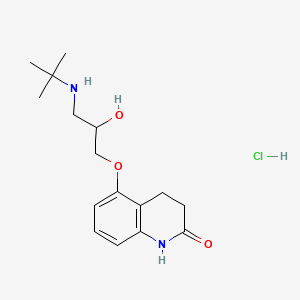



1. Carteolol
2. Carteolol Monohydrochloride
3. Hydrochloride, Carteolol
4. Monohydrochloride, Carteolol
5. Opc 1085
6. Opc-1085
7. Opc1085
1. 51781-21-6
2. Carteolol Hcl
3. Arteoptic
4. Cartrol
5. Mikelan
6. Abbott-43326
7. Ocupress
8. Endak Hydrochloride
9. Opc-1085
10. Opc-1085 Hydrochloride
11. Carteolol (hydrochloride)
12. Nsc-300906
13. Endak
14. 5-(3-(tert-butylamino)-2-hydroxypropoxy)-3,4-dihydrocarbostyril Monohydrochloride
15. 4797w6i0t4
16. Carbonolol
17. Endak Mite
18. Abbott 43326
19. 5-(3-((1,1-dimethylethyl)amino)-2-hydroxypropoxy)-3,4-dihydro-2(1h)-quinolinone Hydrochloride
20. Dsstox_cid_25478
21. Dsstox_rid_80904
22. Dsstox_gsid_45478
23. 2(1h)-quinolinone, 5-(3-((1,1-dimethylethyl)amino)-2-hydroxypropoxy)-3,4-dihydro-, Monohydrochloride
24. 5-(2-hydroxy-3-tert-butylamino)propoxy-3,4-dihydrocarbostyril Hydrochloride
25. Teoptic
26. Chebi:3438
27. 5-[3-(tert-butylamino)-2-hydroxypropoxy]-1,2,3,4-tetrahydroquinolin-2-one Hydrochloride
28. 5-[3-[(1,1-dimethylethyl)amino]-2-hydroxypropoxy]-3,4-dihydro-2(1h)-quinolinone Hydrochloride
29. 5-(3-tert-butylamino-2-hydroxy-propoxy)-3,4-dihydro-2(1h)-chinolinon-hydrochlorid
30. Opc 1085
31. Einecs 257-415-7
32. Dl-carteolol Hydrochloride
33. Nsc 300906
34. Arteolol
35. Carteol
36. Unii-4797w6i0t4
37. Mikelan La
38. 5-[3-(tert-butylamino)-2-hydroxypropoxy]-3,4-dihydrocarbostyril Monohydrochloride
39. Ocupress (tn)
40. Cartrol (tn)
41. Carteolol Hydrochloride [usan:usp:jan]
42. 5-(3-(tert-butylamino)-2-hydroxypropoxy)-3,4-dihydroquinolin-2(1h)-one Hydrochloride
43. Ncgc00016865-01
44. 5-(3-tert-butylamino-2-hydroxy)propoxy-3,4-dihydrocarbostyril Hydrochloride
45. Cas-51781-21-6
46. 5-(3-tert-butylamino-2-hydroxy-propoxy)-3,4-dihydro-2(1h)-chinolinon-hydrochlorid [german]
47. Schembl41380
48. Mls002153816
49. Carteolol Hydrochloride ,(s)
50. Chembl1201002
51. Dtxsid4045478
52. Hms1569i14
53. Pharmakon1600-01505519
54. Bcp28338
55. Ex-a1257
56. Carteolol Hydrochloride [mi]
57. Tox21_110654
58. Carteolol Hydrochloride (jp17/usp)
59. Carteolol Hydrochloride [jan]
60. Hy-17495a
61. Mfcd00941499
62. Nsc300906
63. Nsc760060
64. S4278
65. Carteolol Hydrochloride [usan]
66. Akos027379166
67. Tox21_110654_1
68. Carteolol Hydrochloride [mart.]
69. Carteolol Hydrochloride [vandf]
70. Ccg-213475
71. Nsc-760060
72. 5-(3-((tert-butyl)amino)-2-hydroxypropoxy)-3,4-dihydro-2-quinolone Monohydrochloride
73. 5-[3-(tert-butylamino)-2-hydroxypropoxy]-3,4-dihydro-1h-quinolin-2-one;hydrochloride
74. Carteolol Hydrochloride [usp-rs]
75. Carteolol Hydrochloride [who-dd]
76. Ncgc00179541-03
77. As-74897
78. Smr001233186
79. Db-052022
80. B5944
81. Carteolol Hydrochloride [orange Book]
82. Ft-0640026
83. Sw197155-3
84. Carteolol Hydrochloride [usp Impurity]
85. C75429
86. Carteolol Hydrochloride [usp Monograph]
87. D00599
88. Wln: T66 Bmvt&j Go1yq1mx1&1&1 &gh
89. Sr-01000841202
90. Sr-01000841202-2
91. Q27106078
92. 5-(3-t-butylamino-2-hydroxypropoxy)-3,4-dihydrocarbostyril Hydrochloride
93. 2(1h)-quinolinone,1-dimethylethyl)amino]-2-hydroxypropoxy]-3,4-dihydro-, Monohydrochloride
94. 2(1h)-quinolinone, 5-[3-[(1,1-dimethylethyl)amino]-2-hydroxypropoxy]-3,4-dihydro, Monohydrochloride
95. 2(1h)-quinolinone, 5-[3-[(1,1-dimethylethyl)amino]-2hydroxypropoxy]-3,4-dihydro, Monohydrochloride
| Molecular Weight | 328.83 g/mol |
|---|---|
| Molecular Formula | C16H25ClN2O3 |
| Hydrogen Bond Donor Count | 4 |
| Hydrogen Bond Acceptor Count | 4 |
| Rotatable Bond Count | 6 |
| Exact Mass | 328.1553704 g/mol |
| Monoisotopic Mass | 328.1553704 g/mol |
| Topological Polar Surface Area | 70.6 Ų |
| Heavy Atom Count | 22 |
| Formal Charge | 0 |
| Complexity | 354 |
| Isotope Atom Count | 0 |
| Defined Atom Stereocenter Count | 0 |
| Undefined Atom Stereocenter Count | 1 |
| Defined Bond Stereocenter Count | 0 |
| Undefined Bond Stereocenter Count | 0 |
| Covalently Bonded Unit Count | 2 |
| 1 of 4 | |
|---|---|
| Drug Name | Carteolol hydrochloride |
| Drug Label | Carteolol Hydrochloride Ophthalmic Solution USP, 1% is a nonselective beta-adrenoceptor blocking agent for ophthalmic use.The chemical name for carteolol hydrochloride is ()-5-[3-[(1,1-dimethylethyl) amino]-2-hydroxypropoxy]-3,4-dihydro-2(1H)-quino... |
| Active Ingredient | Carteolol hydrochloride |
| Dosage Form | Solution/drops |
| Route | Ophthalmic |
| Strength | 1% |
| Market Status | Prescription |
| Company | Alcon; Bausch And Lomb |
| 2 of 4 | |
|---|---|
| Drug Name | Ocupress |
| PubMed Health | Carteolol |
| Drug Classes | Antiglaucoma, Antihypertensive, Cardiovascular Agent |
| Drug Label | Ocupress (carteolol hydrochloride ophthalmic solution), 1%, is a nonselective beta-adrenoceptor blocking agent for ophthalmic use.The chemical name for carteolol hydrochloride is ()5[3[(1,1dimethylethyl) amino]2 hydroxypropoxy]3... |
| Active Ingredient | Carteolol hydrochloride |
| Dosage Form | Solution/drops |
| Route | Ophthalmic |
| Strength | 1% |
| Market Status | Prescription |
| Company | Novartis |
| 3 of 4 | |
|---|---|
| Drug Name | Carteolol hydrochloride |
| Drug Label | Carteolol Hydrochloride Ophthalmic Solution USP, 1% is a nonselective beta-adrenoceptor blocking agent for ophthalmic use.The chemical name for carteolol hydrochloride is ()-5-[3-[(1,1-dimethylethyl) amino]-2-hydroxypropoxy]-3,4-dihydro-2(1H)-quino... |
| Active Ingredient | Carteolol hydrochloride |
| Dosage Form | Solution/drops |
| Route | Ophthalmic |
| Strength | 1% |
| Market Status | Prescription |
| Company | Alcon; Bausch And Lomb |
| 4 of 4 | |
|---|---|
| Drug Name | Ocupress |
| PubMed Health | Carteolol |
| Drug Classes | Antiglaucoma, Antihypertensive, Cardiovascular Agent |
| Drug Label | Ocupress (carteolol hydrochloride ophthalmic solution), 1%, is a nonselective beta-adrenoceptor blocking agent for ophthalmic use.The chemical name for carteolol hydrochloride is ()5[3[(1,1dimethylethyl) amino]2 hydroxypropoxy]3... |
| Active Ingredient | Carteolol hydrochloride |
| Dosage Form | Solution/drops |
| Route | Ophthalmic |
| Strength | 1% |
| Market Status | Prescription |
| Company | Novartis |
Adrenergic beta-Antagonists
Drugs that bind to but do not activate beta-adrenergic receptors thereby blocking the actions of beta-adrenergic agonists. Adrenergic beta-antagonists are used for treatment of hypertension, cardiac arrhythmias, angina pectoris, glaucoma, migraine headaches, and anxiety. (See all compounds classified as Adrenergic beta-Antagonists.)
Anti-Arrhythmia Agents
Agents used for the treatment or prevention of cardiac arrhythmias. They may affect the polarization-repolarization phase of the action potential, its excitability or refractoriness, or impulse conduction or membrane responsiveness within cardiac fibers. Anti-arrhythmia agents are often classed into four main groups according to their mechanism of action: sodium channel blockade, beta-adrenergic blockade, repolarization prolongation, or calcium channel blockade. (See all compounds classified as Anti-Arrhythmia Agents.)
Sympatholytics
Drugs that inhibit the actions of the sympathetic nervous system by any mechanism. The most common of these are the ADRENERGIC ANTAGONISTS and drugs that deplete norepinephrine or reduce the release of transmitters from adrenergic postganglionic terminals (see ADRENERGIC AGENTS). Drugs that act in the central nervous system to reduce sympathetic activity (e.g., centrally acting alpha-2 adrenergic agonists, see ADRENERGIC ALPHA-AGONISTS) are included here. (See all compounds classified as Sympatholytics.)
Antihypertensive Agents
Drugs used in the treatment of acute or chronic vascular HYPERTENSION regardless of pharmacological mechanism. Among the antihypertensive agents are DIURETICS; (especially DIURETICS, THIAZIDE); ADRENERGIC BETA-ANTAGONISTS; ADRENERGIC ALPHA-ANTAGONISTS; ANGIOTENSIN-CONVERTING ENZYME INHIBITORS; CALCIUM CHANNEL BLOCKERS; GANGLIONIC BLOCKERS; and VASODILATOR AGENTS. (See all compounds classified as Antihypertensive Agents.)